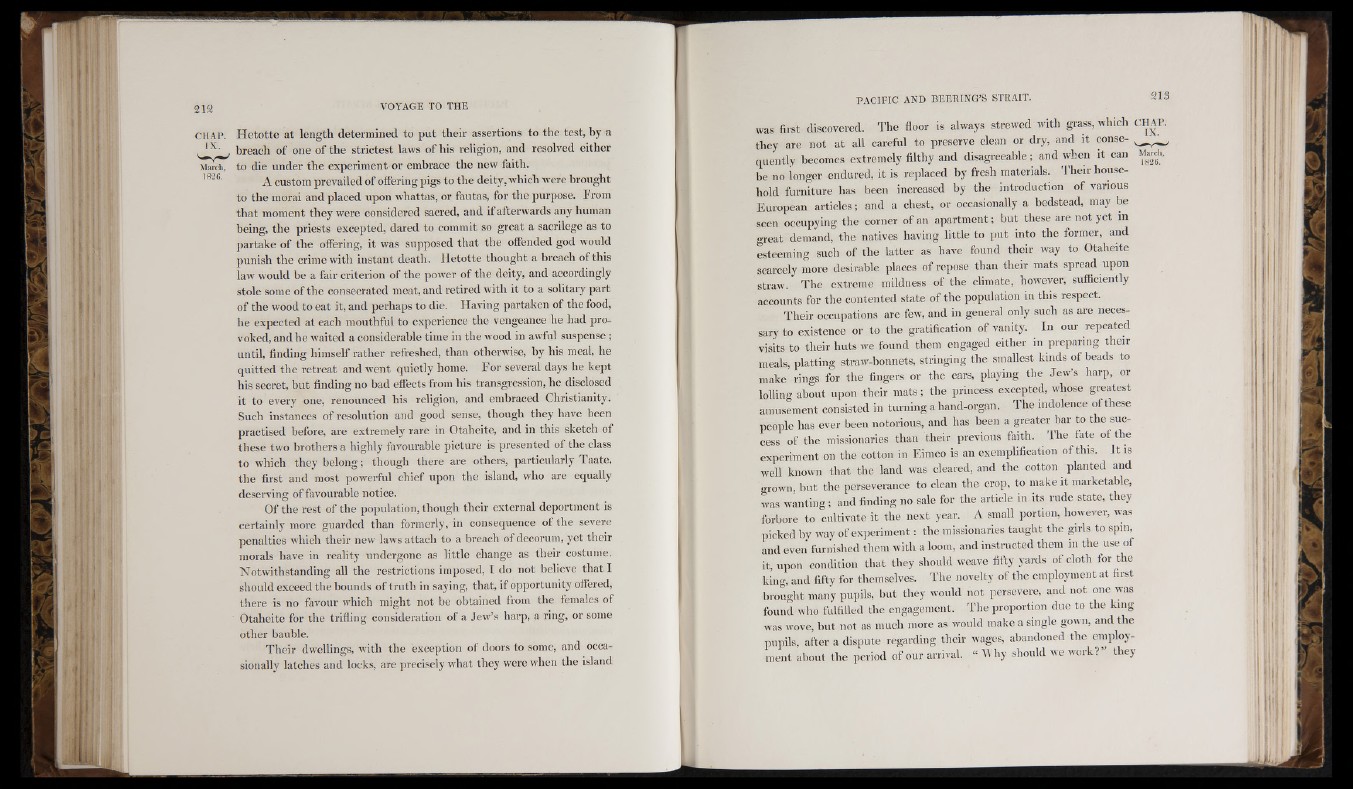
I i '
J!
H .s
212 VOYAGE TO THE
CHAP. Hetotte at length determined to put their assertions to the test, by a
breach of one of the strictest laws of his religion, and resolved either
to die under the experiment or embrace the new faith.
A custom prevailed of offering pigs to the deity, which were brought
to the morai and placed upon whattas, or fautas, for the purpose. From
that moment they were considered sacred, and if afterwards any human
being, the priests excepted, dared to commit so great a sacrilege as to
partake of the offering, it was supposed that the offended god wovdd
punish the crime with instant death. Iletotte thought a hreacli of this
law would be a fair criterion of the power of the deity, and accordingly
stole some of the consecrated meat, and retired with it to a solitary part
of the w'ood to eat it, and perhaps to die. Having partaken of the food,
he expected at each mouthful to experience the vengeance he had provoked,
and he waited a considerable time in the wood in awful suspense ;
until, finding himself rather refreshed, than otherwise, by his meal, lie
quitted the retreat and went quietly home. For several days he kept
his secret, but finding no bad effects from his transgression, he disclosed
it to every one, renounced his religion, and embraced Christianity.
Such instances of resolution and good sense, though they have been
practised before, are extremely rare in Otaheite, and in this sketch of
these two brothers a highly favourable picture is presented of the class
to which they belong; though there are others, particularly Taate,
the first and most powerful chief upon the island, who are equally
deserving of favourable notice.
Of the rest of the population, though their external deportment is
certainly more guarded than formerly, in consequence of the severe
penalties which their new laws attach to a breach of decorum, yet their
morals have in reality undergone as little change as their costume.
Notwithstanding all the restrictions imposed, I do not believe that I
sliould exceed the bounds of truth in saying, that, if opportunity offered,
there is no favour which might not be obtained from the females of
Otaheite for the trifling consideration of a Jew’s harp, a ring, or some
other bauble.
Their dwellings, with the exception of doors to some, and occasionally
latches and locks, are precisely what they were when the island
PACIFIC AND BEERING’S STRAIT. 213
was first discovered. 'I'he floor is always strewed with grass, which C H A P ,
they are not at all careful to preserve clean or dry, and it conse- ,— ^
quently becomes extremely filthy and disagreeable; and when it can Mavci,.
be no longer endured, it is replaced by fresh materials. 'I'heir household
furniture has been increased by the introduction of various
European articles ; and a chest, or occasionally a bedstead, may be
seen occupying the corner of an apartment; but these are not yet in
great demand, the natives having little to put into the former, and
esteeming such of the latter as have found their way to Otaheite
scarcely more desirable places of repose than their mats spread upon
straw. The extreme mildness of the climate, however, sufficiently
accounts for the contented state of the population in this respect.
Their occupations are few, and in general only such as are necessary
to existence or to the gratification of vanity. In our repeated
visits to their huts we found them engaged either in preparing their
meals, platting straw-bonnets, stringing the smallest kinds of beads to
make rings for the fingers or the ears, playing the Jew's harp, or
lolling about upon their mats ; the princess excepted, whose greatest
amusement consisted in turning a hand-organ. The indolence ofthese
people has ever been notorious, and has been a greater bar to the sue-
cess of the missionaries than their previous fiiith. The Ihte of the
experiment on the cotton in Eimeo is an exemplification of this. It is
well known that the land was cleared, and the cotton planted and
o-rown, but the perseverance to clean the crop, to make it marketable,
t v a s wanting; and finding no sale for the article in its rude state, they
forbore to cultivate it the next year. A small portion, however, was
picked by way of exjieriment: the missionaries taught the girls to spin,
and even furnished them with a loom, and instructed them in the use of
it, upon condition that they should weave fifty yards of cloth for die
king, and fifty for themselves. The novelty of the employment at first
brought many pupils, but they would not persevere, and not one was
found who fulfilled the engagement. The proportion due to the king
was wove, but not as much move as would make a single gown, and the
pupils, after a dispute regarding their wages, abandoned the employment
about the period of our arrival. “ Y\ by should we work? they
II../'
ii* 'i
«i II I
T í '
itij.
1 1 1 !
IIIE' j;
II;
iiiii;
i l , '
il '
' 1!!!
■il: